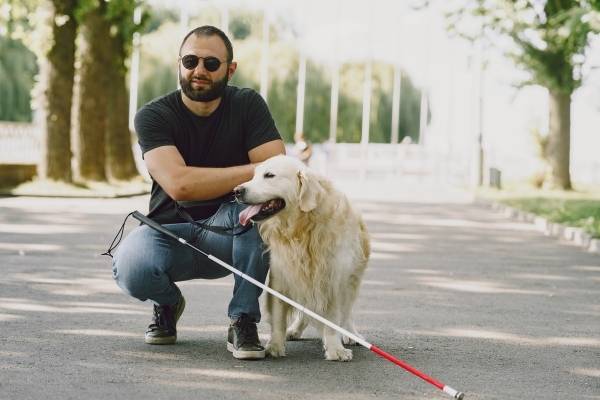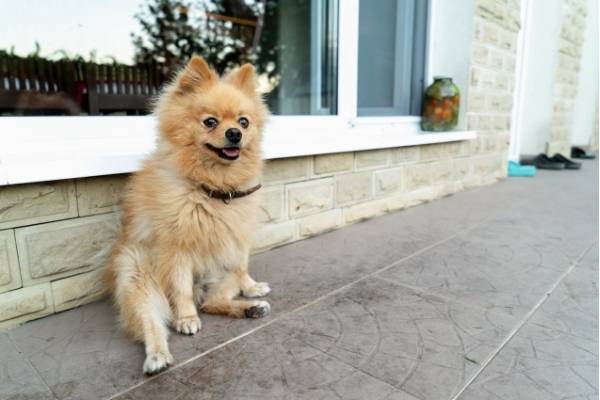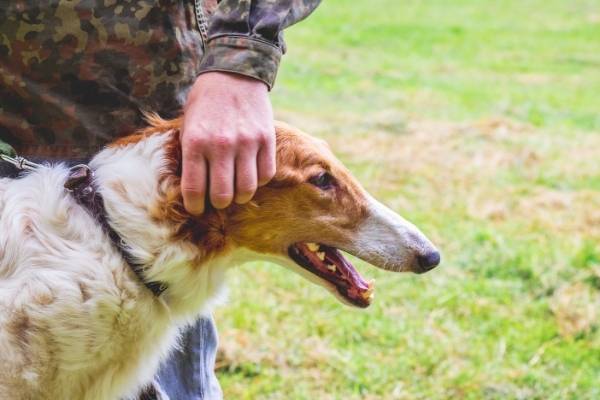Mental illness is a disease.
The cure?
A therapy dog—along with medication.
With the daily hustle-bustle going around, you might feel like giving up. Family issues, relationship issues, breakups, financial issues, health issues, accidents or incidents, or even the noise of heavy traffic that you pass can take a heavy toll on your mental health.
All these stressors make you feel pressured and depressed all the time, or most of the time. In such a situation, you’d want companionship with whom you can share everything, have their shoulder to cry on, and feel loved and relaxed. You’d want someone that won’t judge you or tell-tale anything that you tell them.
A “Therapy Dog” represents everything you are looking for in your “someone”.
This article will guide you about the best therapy dogs and suggest which one is best for you.
What Are Therapy Dogs?
A therapy dog is a term used for those canines that can provide emotional help to patients with illnesses such as depression, anxiety, frustrations, mood swings, and other mental disorders.
Their sweet and alluring outlooks, warm and lovesome cuddles, and all-time attentiveness to you can lullaby your depressive thoughts and reinvigorate your happy side. Their ensorcelling demeanor will lower your blood pressure and heart rate, reduce patient anxiety, and increase the levels of endorphins and oxytocin.
You can either hire therapy dogs from organizations that provide you with the service or train your dog to be a therapy dog.
Training a dog for therapeutic purposes takes time and perseverance. Here, we’d suggest hiring a therapy dog if you are currently enduring an emotional trauma.
Qualities of Therapy Dogs
The canine world has a variety of dog breeds having different qualities. There are companion dogs, working dogs, guard dogs, protection dogs, etc. these dogs are grouped based on their behavior, physique, sizes, etc. There are dogs that are emotionally sensitive and crave the companionship of their masters all the time, and there are dogs that are aloof, domineering, and keep only to themselves.
Talking specifically about therapy dogs, there are some behavioral aspects based on which they are considered to have the potential to be trained for therapy purposes.
Though all dogs have the potential to provide you with emotional support, there are specific training sessions that are required to enable them to keep up with your emotions.
For a dog to qualify for psychological assistance training, it should possess the following qualities.
1. Trainability
Therapy dogs have high trainability. They have to pass certain tests that assess if he is fit for the job or not. A dog must be able to pick up training lessons quickly and retain them.
2. Intelligence
Trainability is only possible if a dog is smart. Teaching your dog will only be fruitful if he can understand what you want him to do.
3. Overall Friendliness and Socialization
You don’t need to use your therapy dog for yourself only, rather there comes a time that your friend or family member is in need of emotional help.
In such situations, it is necessary that your dog has internalized socialization skills and friendliness. These qualities are then further refined by training.
4. Playfulness
Playfulness, sprightliness, and nimbleness are the must-have traits for a dog to be trained as a support dog. Such canines give energetic vibes to the patient and motivate them to get up and get into play with these dogs.
5. Adaptability
It is not necessary that you keep your therapy dog in one place all the time. If your friend takes your buddy with him, or you take your dog to visit hospitals and children’s homes, etc., your dog must have the adaptability to deal with new situations.
6. Obedience
Obedience is another qualifier in this domain. Your dog should listen to your commands and follow them with or without treats. If you take him to the hospital and he starts sniffing around or barking, at that time obedience training becomes handy.
7. Focus
Focus is required if you intend to volunteer your dog to clinics or old homes. Such places are filled with distractions. There could be other pets, treats, toys, bedsheets, shoes, etc. Your dog needs to have control to not be distracted by anything and stay focused on his task of making others happy.
8. Comfortable Being Touched
There are many times that your dog is patted on the head, back, cheeks, or tail. For such situations, only those dogs are suitable that don’t see strangers as a threat and are comfortable with their touching.
9. Calm
Freaking out, barking, circling, and digging, etc., are surely not the signs of a calm dog. Though a therapy dog needs to be energetic, he shall have the necessary composure. Fidgety dogs having behavioral issues are least likely to master the art of disencumbering the mental burdens of patients.
If you want a therapy dog, make sure he/she has these qualities.
Here we have listed ten dog breeds that you can bring home for your comfort and emotional support.
8 Best Therapy Dog Breeds
1. Labrador Retriever

Ranking on the top of the most popular US dog breed, Labradors is a jack of all trades in the dog world.
Affectionate, intelligent, loyal, and sweet, these four words perfectly describe Labrador Retrievers. They have the reputation of a perfect family dog, thanks to their composed temperament. Their easy-going nature makes them a perfect choice for therapy purposes.
2. Golden Retriever

Savvy, calm, happy, tongue-in-cheek Golden Retrievers are inherently well-behaved dogs. If you bring in a Goldie, he will easily mix up with you owing to his confident and adaptable disposition. They are not bothered by the crowd; not bothered by a stranger patting them; not bothered by distractions. Families and pets will enjoy spending time with them, and they accept strangers easily.
3. Poodle

If there is any list that includes the lovey-dovey and charismatic dog breeds, Poodles are always seen standing in the frontline.
Poodles come in different sizes: Standard, small, and teacup. If you have been a pillow hugger, a standard Poodle will do best for you. You can hug them all the time, and they won’t try to get away. Their sensitive and understanding nature will solace your heartache and you’d definitely feel better afterward.
4. Pomeranian

Poms inherently have a happy face. Short snouts, black eyes, and pink tongues add to their adorable furry looks that can soak up all your emotional stresses at the very first glance.
Bringing a Pomeranian will not only cheer you up, but you would also not feel lonely at all. Their attention-seeking nature will keep your mind busy and you won’t have time to think about things that hurt you.
5. French Bulldog

These companion dogs have a very serene and calm demeanor. They have a flexible nature and easily get along with children, cats, and strangers. Though French Bulldogs are lazy, they love playing with their owners. Playfulness and doing fun stuff make them very happy. They are mouthy and like to dig their paws in soft things such as sofas, couches, cushions, etc.
6. Greyhound

You might be thinking, why a quintessentially athletic dog breed is on this list?
It is because of their flexible nature, docility, and soothing looks!
Usually, these dogs are trained for running competitions. But after retirement, they are given the job of making people happy. These dogs are mostly trained for providing therapy services in old homes or patient rooms. Their non-sensitivity to touch, even of strangers, makes them excellent therapy dogs. You can caress your Greyhound as much as you want, and he won’t try to run away. Instead, he would look up to you, giving you all the emotional support you need.
7. Pug

Pugs are the living stuffed toys.
Their short build makes it easy to pick them up. You can carry them with you all the time. They have a totally non-aggressive nature and socializing them is as easy as pie.
What makes them lovely is their attachment to their owners. Though they prefer to lay on the couch and enjoy their resting position, pugs love to play with their masters. They are always wandering around them, looking forward to kissing and licking. You’d feel absolutely loved up having a pug by your side.
8. Dachshund

Their short legs, mesomorph body, floppy ears, and long nose endow Dachshunds with a unique appearance.
Everywhere they go, their friendly nature earns them love and appreciation, and they repay that kindness by showering people with affection. This makes them wonderful therapy dogs.
If you’re experiencing a stressful period in your life, bringing him home would be beneficial. Their dedication, eye contact, and keenness in listening to you make them appear a thoughtful friend. This emotional catharsis will draw out your stress and all of your anxiety and depression will go away.
It is worth mentioning here that all of these breeds can lift your spirits up; however, if you want them to be a proper therapy dog, you’d need to train them and certify that training from reputable AKC affiliated therapy dog organizations. Certification is necessary if you want to volunteer your dog in facilities such as schools for special children, hospitals, deaf children schools, or old homes.
Adopting your dog from one of these best therapy dog breeds is one thing and training them to do the job is another. Surely, without training, your dog can still cuddle and snuggle you. However, if you want your dog to follow your instructions and obey you, you will have to train them for the job.
